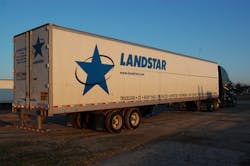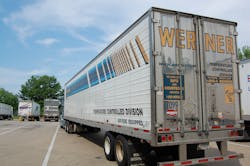The Dow Jones industrial average posted its largest one-day loss in history on Feb. 5, continuing a sell-off first seen in the transportation sector in late January.
The Dow’s loss of 1,175.21 points followed a decline of more than 650 points in the previous trading session.
Also on Feb. 5, the Standard and Poor’s index dropped 4.1%, the biggest one-day decline since August 2011, and Nasdaq declined 3.8%. Many analysts attributed the initial declines to data showing rising wages, raising concern of inflation.
Meanwhile, the Dow Jones Transportation Average, made up of 20 stocks, dropped 3.15% to 10,350 on Feb. 5. That is lower than where it started 2018, but well above the 52-week low of 8,744.
On Jan. 26, Andrea Kramer of Schaeffer's Investment Research posted an article stating the Dow Jones Transportation Average had lost more than 2% for the week. It was only the second time since 2006 that average posted a loss that large, while the overall Dow posted a gain of at least 1%.
Kramer suggested this could result in the market “getting nervous at the divergence” She added "we could expect some short-term underperformance for both the industrial average and Dow Transports, and more volatility than usual. However, the long-term returns look promising.”
The outlook for most trucking fleets and manufacturers also looks promising, based on recent earnings reports and conference calls.
“What we've seen thus far in 2018 continues to suggest better than normal seasonal trends developing in the first quarter,” said analyst Jason Seidl of Cowen in a report on Landstar System.
He followed up several days later in a note on USA Truck saying that “the backdrop remains highly favorable.”
J.B. Hunt Transport Services and Knight Transportation were among other carriers posting strong quarterly and annual results. Knight said demand was high in December and January, and it was seeing capacity tightness from the electronic logging device mandate.
On the flip side, fleets cited the driver shortage, wage pressures, and higher fuel prices as weighing down results. Several said they were unable to fully leverage the peak shipping season and rising e-commerce shipments, leading to planned organizational adjustments and investments to better handle these surges in the future.
Truckload carrier Werner Enterprises were among the companies noting they were already benefiting from the tax reform legislation signed into law by President Trump in December.
Werner’s fourth-quarter results included a $110.5 million reduction in income tax liabilities, and Covenant Transport also reaped significant gains, said CEO David Parker. “I couldn’t be any more excited than I am for 2018,” Parker said.
Trailer manufacturer Wabash National said its overall income tax rate was expected to drop about 10%, providing “a meaningful increase in available funds to support the business in many ways.”
As fleets posted positive results, so did manufacturers.
AB Volvo raised its 2018 commercial vehicles outlook after the Volvo Group achieved its highest sales and operating income in history. Likewise Daimler AG posted a big jump in truck sales across most of the world. It said truck sales will be “significantly higher” in 2018, including in North America.
Paccar Inc., the maker of Peterbilt and Kenworth trucks, reported record revenue and its second highest annual profit in company history in 2017.
Wabash also expects more good times ahead. “We continue to believe the demand environment for trailers overall will remain healthy as fleet age, regulatory compliance requirements such as the ELD implementation, a strong economy and customer profitability all support a continuation of a strong and extended trailer cycle,” said CEO Dick Giromini.
About the Author
Neil Abt
Neil Abt is a former FleetOwner editor who wrote for the publication from 2017 to 2020. He was editorial director from 2018 to 2020.



